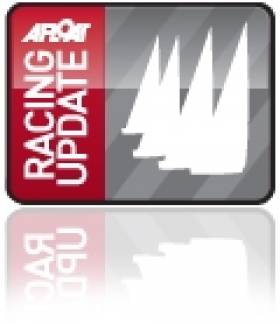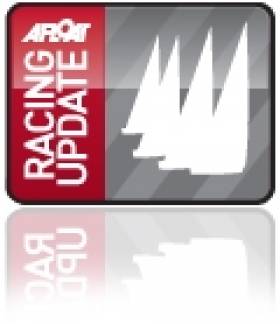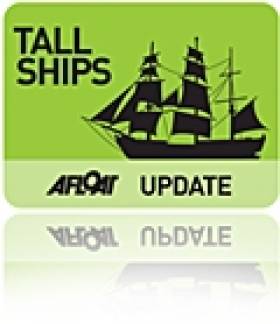Displaying items by tag: Balyholme Yacht Club
#multihull – Competitors from all the cat clubs came to Ballyholme Yacht Club last weekend to have some great racing over short course format with multiple starts. Saturday dawned with little and fickle winds but when the SW building breeze settled the fleet was treated to five competitive races. Adrian Allen and Barry Swanston were in dominant form with five wins.
A great challenging NW breeze of 15kts – 22 kts met us on Sunday to test every one with very fast downhill rides. Adrian and Barry again won the races, but with all five leading F18's hitting the top mark together in a wall of spray and curses racing was very competitive !
Wyatt Orsmond in his new Goodall C2 from Blessington Sailing Club was however biting at his heels finishing second overall and is sure to provide stiff competition in the events to come.
Maxie who was put in at the deep end with Biddy from Swords Sailing Club may well have wished for a softer introduction to Catamaran F18 sailing but finished extremely well in third place. Jenni Brittain sailing with Swannie in her first Irish event counting only a few hours F18 sailing experience had some very encouraging results and began to show some form even in the big breeze, finishing on joint points with Biddy and a very bruised Maxie, loosing out on discard to fourth place.
Ballyholme F18 World Champs Get Three Seasons in One Day
#f18s– The F18's experienced 3 seasons today in Bangor, Northern Ireland at the 2014 F18 World Championships. After last night's Ballyholme Yacht Club "home hospitality" and with a few sore heads, the day started off with little wind and vertical rain. Thankfully the forecasted breeze and sunshine started to set in just as the fleet went afloat, and the day finished with 20 knots, sunshine and rolling waves.
After only 1 race yesterday, the fleet were a little eager resulting in 2 general recalls and the resultant black flag start when everyone got away clean in just 6 knots of breeze.
Despite the delay and being ferried out to the start in a high powered Rib, local helm Adrian Allen was still four minutes late for the start having had to go to his daughter's graduation this morning at Queens University.
Most of the fleet plumped for the right side of the course and GBR's Grant Piggot and Simon Farren found themselves first at the windward mark with a large lead over FRA Rouges/Souben and GER Tonne/Sunnocks. With a 20 degree shift to the right, a mark boat was positioned below the gate to signal a course change starboard and shortened.
Unfortunately Grant mistook this for a shortened course and proceeded to the finish line under spinnaker where he dropped it and turned to watch the others off up the beat. He somehow managed to regain first place by the next windward but had lost the lead and on the run was passed by Patrick Demesmaeker and Klass Victor from Royal Belgium Sailing Club followed by the French Mourniac's and the German Sach brothers.
Thankfully by Race 3, the fleet decided that they were fed up with general recalls and everyone got away cleanly. Still in light winds, it was the turn of the a clean youth team from Florida - Taylor Reiss and Matthew Whitehead - to show the rest of fleet a clean pair of hulls and lead the way home from the first mark. The Sachs brothers backed up their earlier light wind showing to take second and the overall lead.
A little more wind for Race 4 got things a bit excited. Gunnar Larsen and Ferdinand van West were clean first off the start line followed out by Reiss/Whitehead over to the left.
Unfortunately for Glenn Asby and Brett Goodall, a Dutch boat barged in below them forcing them head to wind at the Committee Boat and having to gybe off and find clean air behind the rest of the fleet. At the other end two French boats bounced off the pin end mark boat onto port and then took out the Irish crew of Dermot McHugh and Siobhan Keogh. More wind on the left saw many of the boats coming into the windward mark on port although the extra power made "threading the needle" and finding a gap more easy than normal. As the breeze started to build there were a few flogging kites on the downwind legs but Larsen/ van West showed their pedigree to finish ahead of the French crews of Lois Breeder and Hugo le Pomellec, followed the Mourniac family.
First Irish boat home in Race 4 was local crew Andrew Gallagher and Michael Gunning despite being squeezed out at the final mark by a boat coming in on port and having to crash gybe on the wong side of the course. Unfortunately the protest committee didn't agree that their shout of protest was within the allotted 3 seconds - something to learn for next time. Another visit to the protest room saw the Finnish crew first withdraw their original protest and then be told that they hand't completed the course properly as they had capsized at the bottom mark and drifted past it rounding the other "gate" mark instead of rerounding the original one. More learning points.
A fouth race of the day, Race 5 saw gust of up to 20 knots and everyone twin wiring. The Finnish crew found themselves on the wrong side of the start line but everyone else got away clean. Morgan La Graviere and Armaud Jarlegan from Nantes found themselves first in front of Glenn Ashby and Brett Goodall at the windward mark. By the downwind gate Larsen/Van West squeezed ahead of the Australians. Adrian Allen and Barry Swanston were leading the local fleet while many were pitchpoling and capsizing. Others were breaking rudders while one unfortunate crew discovered the "salami slicer" with a suspected broken arm.
At the end of the second day with 5 races, Larsen/ van West leads from Ashby/Goodall and the young Americans Reiss/ Whitehead. Tomorrow's forecast looks set for more of the final conditions with 15-20 knots, rolling seas and sunshine. America's Cup sailor Glenn Ashby was heard to bemoan the length of the course today hoping for something a bit shorter tomorrow. Unusually for a crew, Brett however is "loving it' and just can't wait!
Ocean Youth Trust 'Reviews Procedures' in Wake of Lord Rank Sinking
Following the sinking of Ocean Youth Trust's (OYT) Lord Rank on June 8th and the UK's Marine Accident Investigation Board's subsequent examination, OYT has taken 'a number of actions to ensure the future safe operation' of its vessels. This includes 'a review of its procedures and their implementation on board', according to an MAIB report HERE.
The report says The Lord Rank was engaged in a charity fund-raising event last June 8 and was scheduled to call at a number of Northern Ireland ports. The vessel completed her fund-raising activities at Ballycastle and departed port at 2100 with three crew and three passengers on board. The next port of call was Portrush, a passage of about 3 hours under power. No passage planning was undertaken. On clearing the breakwater, the skipper ordered the helmsman to head in a northerly direction. About 10 minutes later he ordered the helmsman to alter course to port and head towards a visual reference point. No further position monitoring was undertaken. The vessel went aground on Carrickmannanon Rock at about 2123. The skipper then broadcast a 'PAN PAN' message on VHF radio that was acknowledged by the Coastguard. A rescue operation involving a helicopter, an inshore lifeboat and an all weather lifeboat ensured that the crew and passengers were landed safely ashore. STV Lord Rank subsequently sank.
The Marine Accident Investigation Branch (MAIB) examines and investigates all types of marine accidents to or on board UK ships worldwide, and other ships in UK territorial waters.
The Chief Inspector of Marine Accidents has written to Ocean Youth Trust Ireland emphasising that 'professional standards need to be maintained at all times'.
The OYT's agm will be held at Balyholme Yacht Club in Bangor, Northern Ireland on October 18th at 7pm.































































